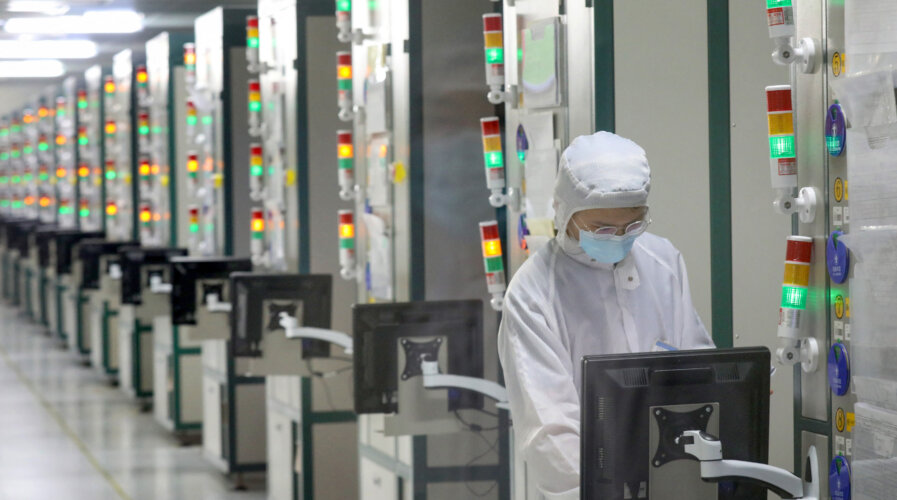
Local governments in China are ramping up investments into chip, high-tech industriesImage: An employee works at a factory of Jiejie Semiconductor Company in Nantong, in eastern China’s Jiangsu province on March 17, 2021. (Photo by AFP) / China OUT
Local governments in China are ramping up investments in the chip, high-tech industries
- Local governments in China are doubling down on cash incentives and policy support for home-grown chip and high-tech related companies, following the US-imposed export controls.
- The most recent being the municipal government of Guangzhou, which has invested US$29 billion to help spur activities involving the city’s semiconductors, renewable energy, and other high-tech fields.
After unexpectedly dropping its Covid restrictions late last year, China began its journey towards economic recovery, focusing primarily on the chip and manufacturing sector. Although preliminary data indicate overall growth isn’t roaring back on all cylinders yet, municipal governments around the country have been ramping up efforts to support local companies to buoy market confidence and boost economic growth.
In the technology sector, dozens of initiatives have been announced by the municipal governments of Beijing, Shenzhen, and Hangzhou, the most recent being Guangzhou. Once again, the common aim is to help boost China’s economic recovery as the country emerges from three years of strict pandemic controls.
China has also been trying to circumvent the new export controls imposed by the Biden Administration last October. For starters, the standard argument that increased US technology regulation is counter-productive because it encourages China to double down on technology independence is, at most, a red herring.
It is fair to note, however, that Chinese President Xi Jinping emphasized at the 20th Communist Party Congress last year that technological advancement and independence echo longstanding central government aspirations. As the country faces growing economic and technological rivalry with the US, the approach to self-reliance is now viewed with more urgency.
How exactly is China helping spur the chip, high-tech industry?
Like all recent US legislation meant to address its supply chain anxiety, the most prominent behind-the-scenes driver of the latest actions by Washington is China – or, more precisely, fear of China. In turn, local governments in China have been doubling down on cash incentives and policy support for home-grown semiconductor companies as part of Beijing’s drive to achieve greater self-sufficiency in the chip sector amid heightened rivalry with the US.
Just this week, according to the South China Morning Post (SCMP), the municipal government of Guangzhou has invested a staggering US$29 billion (200 billion yuan) to establish funds to help spur activities involving semiconductors, renewable energy, and other high-tech fields in the city.
Announced over the weekend, local authorities in Guangzhou said 150 billion yuan would be injected into an Industry Investment Fund of Funds (FoF), focusing on financing activities in semiconductors, renewable energy, and advanced manufacturing. An FoF, designed to allocate cash to a portfolio of investment funds, is increasingly used by Chinese local governments to develop preferred industries.
“The FoF, which will invest via sub-funds and direct financing, aims to attract medium- to large-size projects to Guangzhou and gradually expand into a cluster of funds totaling 600 billion yuan,” SCMP stated, quoting a government statement. Guangzhou’s latest initiative is basically in line with calls made by China’s leadership to help revitalize the country’s beleaguered private sector during the 20th Party Congress last October.
Forming government-led funds is common in China, where state-level financial support has helped develop significant industries over the past decades. A quick recap shows that just last month, the government of eastern Anhui province announced that it, too, will set up a guidance fund of 200 billion yuan, targeting tech industries.
In the same month, the municipal government of Xian, the capital of northwestern Shaanxi province, unveiled a plan to form a group of funds worth more than 100 billion yuan to focus on investments in advanced manufacturing. Even China’s tech hub Shenzhen has ambitions to double down on efforts to grow its local chip industry through large subsidies and cash rewards, by increasing its financial support for the industry.
READ MORE
- Strategies for Democratizing GenAI
- The criticality of endpoint management in cybersecurity and operations
- Ethical AI: The renewed importance of safeguarding data and customer privacy in Generative AI applications
- How Japan balances AI-driven opportunities with cybersecurity needs
- Deploying SASE: Benchmarking your approach


